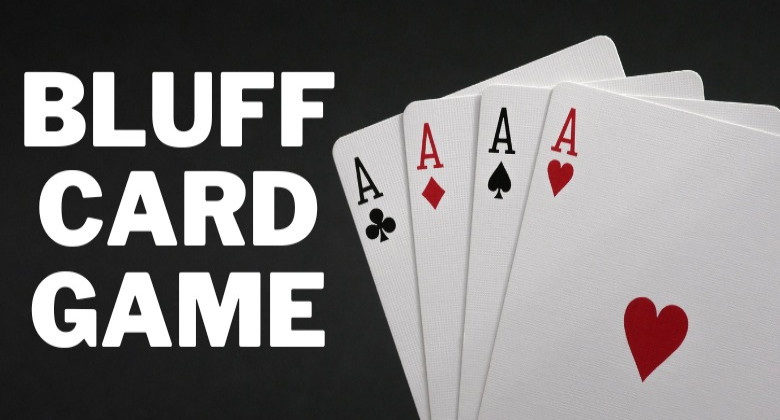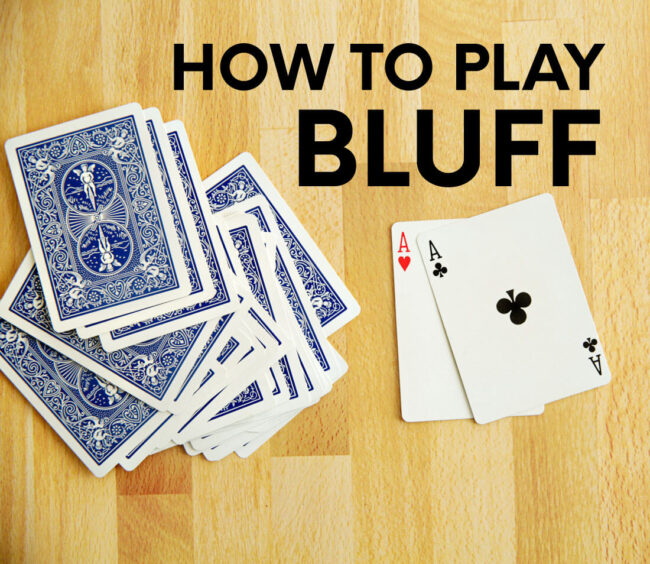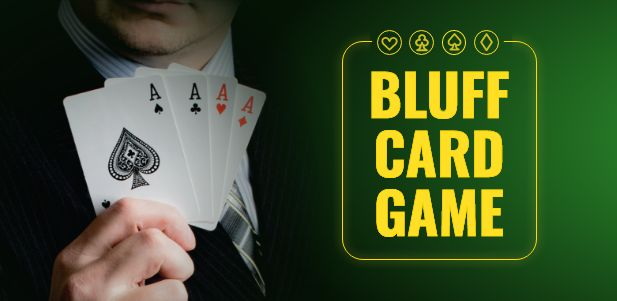Content Menu
● Introduction
● Game Overview
>> Objective
>> Setup
● Basic Rules
>> Starting the Game
>> Gameplay Flow
>> Ending a Round
● Advanced Strategies
>> Mix Up Your Plays
>> Maintain Composure
>> Observe Opponents
>> Intermittent Honesty
>> Endgame Strategies
● Playing Online vs In-Person
>> Online Gameplay
● Variations of Bluff
>> Liar's Dice Variation
>> Cheat (or I Doubt It)
>> Reverse Bluff
>> Team Play
● Social Aspects of Bluff
>> Building Relationships
>> Learning About People
>> Enhancing Communication Skills
● Conclusion
● Related Questions
>> 1. What is the minimum number of players required for Bluff?
>> 2. Can you use wild cards in Bluff?
>> 3. How do you win at Bluff?
>> 4. Is Bluff suitable for children?
>> 5. How long does a typical game of Bluff last?
● Citations:
Introduction
Bluff is a popular card game that combines elements of deception, strategy, and luck. The objective of the game is straightforward: players aim to be the first to discard all their cards. However, the excitement comes from the ability to bluff opponents about the cards they are playing. This article will provide a comprehensive guide on how to play the Bluff card game, including its rules, strategies, and tips for success.

Game Overview
Bluff can be played with a standard deck of 52 playing cards and is typically suited for 3 to 6 players. The game promotes interaction among players as they try to outsmart each other through bluffing and strategic plays.
Objective
The primary goal of Bluff is to be the first player to get rid of all your cards. Players achieve this by either playing cards honestly or bluffing about the cards they are placing down.
Setup
1. Deck Preparation: Shuffle a standard deck of 52 cards thoroughly.
2. Card Distribution: Deal the entire deck evenly among all players. If there are leftover cards, they can be placed aside or used in subsequent rounds.
3. Player Arrangement: Players sit in a circle or around a table, making it easy for everyone to see each other's actions.
Basic Rules
Understanding the basic rules is crucial for enjoying the game of Bluff.
Starting the Game
1. First Player: The player to the dealer's left typically starts the game by announcing a rank (e.g., "two") and placing one or more cards face down in the center.
2. Truth or Lie: The player may either play cards of the announced rank or bluff by playing different cards while claiming they are of that rank.
Gameplay Flow
1. Next Player's Turn: The turn moves clockwise around the table. Each player must either:
- Play one or more cards of the announced rank (truthfully or by bluffing).
- Pass their turn if they cannot play a card of that rank.
2. Challenging a Play: If a player believes another has bluffed, they can challenge by saying "Bluff!" This initiates an inspection of the played cards.
- If the challenged player is found to have lied, they must pick up all cards in the center pile.
- If they were truthful, the challenger must pick up the pile instead.
Ending a Round
A round continues until:
- All players pass their turn, at which point the last player to play becomes the new lead for the next round.
- A player successfully plays all their cards, declaring victory for that round.

Advanced Strategies
While Bluff is largely a game of chance, employing strategic tactics can significantly enhance your chances of winning.
Mix Up Your Plays
- Vary Card Combinations: Don't always play multiple cards of the same rank; mix them up to create uncertainty among opponents.
- Use Jokers Wisely: If using jokers as wild cards, play them strategically to confuse your opponents.
Maintain Composure
- Keep a Straight Face: When bluffing, avoid showing any emotional reactions that might give away your intentions.
- Confidence is Key: Present your plays confidently; hesitation can lead others to suspect you are bluffing.
Observe Opponents
- Study Patterns: Pay attention to how often your opponents bluff and their reactions when challenged.
- Trust Your Instincts: If you sense someone is bluffing based on their behavior or previous plays, don't hesitate to call them out.
Intermittent Honesty
- Mix Truth with Lies: To keep opponents guessing, alternate between honest plays and bluffs.
- Avoid Predictability: Consistent bluffing may lead opponents to catch on; maintain an unpredictable pattern.
Endgame Strategies
- Timing Your Bluffs: As you near running out of cards, consider when it's best to bluff versus when it's better to play honestly.
- Assess Risks: Weigh the risk of being caught against potential rewards when deciding whether to challenge another player's claim.
Playing Online vs In-Person
Bluff can also be played online through various platforms that offer digital card games. While many rules remain consistent, there are some differences:
Online Gameplay
1. Interface Interaction: Players click buttons to play cards rather than physically placing them down.
2. Automated Challenges: Some online versions automatically handle challenges and penalties without needing verbal calls.
3. Global Opponents: Online platforms allow you to play against people from around the world, adding diversity in strategy and style.
Variations of Bluff
Bluff has many variations that can change gameplay dynamics significantly:
Liar's Dice Variation
In this version, players use dice instead of cards. Each player rolls a set number of dice and must declare how many dice show a certain value without revealing their rolls. Players can then challenge each other's claims similarly to traditional Bluff.
Cheat (or I Doubt It)
This variation allows players not only to bluff but also to call out specific ranks rather than just saying "Bluff." It adds an extra layer of strategy as players must decide whether to call out a specific card or simply challenge with "Bluff."
Reverse Bluff
In this twist, players must always play higher-ranked cards than what they declare. This forces players into more strategic thinking about when to bluff and when to play honestly since they cannot simply play lower-ranked cards without being challenged.
Team Play
In larger groups, Bluff can be played in teams where two or more players work together against another team. This variation encourages collaboration and shared strategies while maintaining individual deception tactics.
Social Aspects of Bluff
Bluff is not just about winning; it's also about social interaction and engagement among players:
Building Relationships
Playing Bluff fosters camaraderie as players engage in friendly banter and psychological warfare through bluffs and challenges. The social dynamics can lead to memorable moments and laughter as players share stories about their most successful bluffs or epic failures.
Learning About People
The game serves as an excellent way to learn about others' personalities—how they handle pressure, whether they are risk-takers or cautious players, and how well they can read others' emotions and intentions.
Enhancing Communication Skills
As players must communicate their intentions—whether truthful or deceptive—Bluff helps enhance verbal communication skills while also improving non-verbal cues like body language and facial expressions.
Conclusion
Bluff is not only about luck but also about reading your opponents and strategically managing your own hand. By mastering both basic rules and advanced strategies, players can enhance their gameplay experience and increase their chances of winning. Whether playing casually with friends or competitively online, Bluff offers endless fun and excitement through its unique blend of deception and strategy.
The game encourages social interaction and helps develop key skills such as observation, communication, and psychological insight—all while providing an entertaining experience that keeps everyone on their toes.

Related Questions
1. What is the minimum number of players required for Bluff?
The minimum number of players required for Bluff is three; however, it can accommodate up to six players comfortably.
2. Can you use wild cards in Bluff?
Yes, some variations allow for wild cards like jokers, which can represent any rank during gameplay.
3. How do you win at Bluff?
To win at Bluff, you need to be strategic in your bluffs while also paying attention to other players' behaviors and patterns.
4. Is Bluff suitable for children?
Yes, Bluff can be adapted for children by simplifying rules or using fewer ranks in play.
5. How long does a typical game of Bluff last?
A typical game of Bluff lasts about 30 minutes but can vary depending on player skill levels and strategies employed.
Citations:
[1] https://www.youtube.com/watch?v=8J6JyNRl7HM
[2] https://www.irish-boxing.com/top-secret-winning-strategies-of-bluff-card-game/
[3] http://www.blogjava.net/waterjava/archive/2007/07/12.html
[4] https://www.instructables.com/How-to-play-bluff/
[5] https://futureeducationmagazine.com/master-playing-online-bluff-card-game/
[6] https://huggingface.co/openbmb/cpm-bee-1b/commit/bd72a61dd7a59086ed7456f1dfcaa995c8ec58a3.diff?file=vocab.txt
[7] https://www.blitzpoker.com/blogs/how-to-play-bluff-card-game/
[8] http://www.blogjava.net/waterjava/archive/2008/04/27.html
[9] https://www.adda52.com/bluff-card-game































